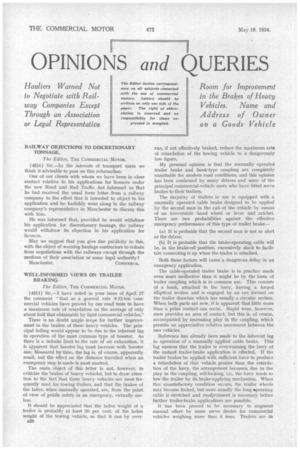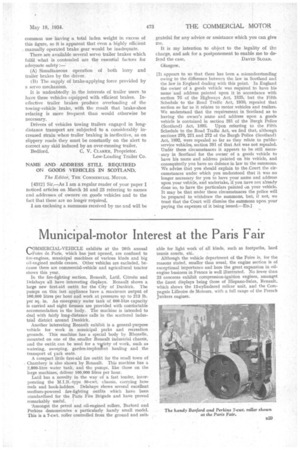OPINIONS and QUERIES
Page 38

Page 39

If you've noticed an error in this article please click here to report it so we can fix it.
RAILWAY OBJECTIONS TO DISCRETIONARY TONNAGE.
The Editor, THE COMMERCIAL MOTOR.
[43101 Sir,—la the interests of transport users we think it advisable to pass on this information.
One of our clients with whom we have been in close contact relative to his applications for licences under the new Road and Rail Traffic Act informed us that he had received the usual form letter, from a railway company to the effect that it intended to object to his application and he foolishly went along to the railway company's representative in Manchester to discuss this with him.
He was informed that, provided he would withdraw his application for discretionary tonnage, the railway would withdraw its objection to his application for licences.
May we suggest that you give due publicity to this, with the object of warning haulage contractors to refrain from negotiations with the railways except through the medium of their association or some legal authority?
Manchester. COMMERCE.
WELL-INFORMED VIEWS ON TRAILER BRAKING.
The Editor, THE COMMERCIAL MOTOR.
[4311] Sir,—I have noted in your issue of April 27 the comment "that as a general rule 8-12-ton commercial vehicles have proved by our road tests to have a maximum rate of retardation on the average of only about half that obtainable by light commercial vehicles."
There is no doubt ample scope for further improvement in the brakes of these heavy vehicles. The principal failing would appear to be due to the inherent lag in operation of the most common type of booster. As there is a definite limit to the rate of air exhaustion, it is apparent that booster lag must increase •with booster size. Measured by time, the lag is, of course, apparently small, but the effect on the distance travelled when an emergency stop is made is most marked.
The main object of this letter is not, however, to criticize the brakes of heavy vehicles, but to draw attention to the fact'that these heavy vehicles are most frequently used for towing trailers, and that the brakes of the latter, when manually operated, are, from the point of view of public safety in an emergency, virtually useless.
It should be appreciated that the laden weight of a trailer is probably at least 50 per cent. of the laden weight of the towing vehicle, so that it can by over n28 run, if not effectively braked, reduce the maximum rate of retardation of the towing vehicle to a dangerously low figure.
My personal opinion is that the manually operated trailer brake and hook-type coupling are completely unsuitable for modern road conditions, and this opinion has been confirmed by many drivers and some of the principal commercial-vehicle users who have fitted servo brakes to their trailers.
The Majority of trailers in use is equipped with a manually operated cable brake designed to be applied by the second man in the cab of the vehicle by means of an irreversible hand wheel or lever and .ratchet. There are two probabilities against the effective emergency performance of this type of trailer brake—
(a) It is probable that the second man is not so alert as the driver.
(b) It is probable that the brake-operating cable will be, in the brake-off position, excessively slack to facilitate connecting it up when the trailer is attached.
Both these factors will cause a dangerous delay in an emergency application.
The cable-operated trailer brake is in practice made even more ineffective than it might be by the form of trailer coupling which is in common use. This consists of a hook, attached to the lorry, having a forged elliptical section and is engaged by an eye formed on the trailer drawbar which has usually a circular section. When both parts are new, it is apparent that little more than a point contact can occur. Rapid wear, however, soon provides an area of contact, but this is, of course, accompanied by increasing play in the coupling, which permits an appreciative relative movement between the two vehicles.
Reference has already been made to the inherent lag in operation of a manually applied cable brake. This lag ensures that the trailer is over-running the lorry at the instant trailer-brake application is effected. If the trailer brakes be applied with sufficient force to produce a retardation of that vehicle greater than the retardation of the lorry, the arrangement becomes, due to the play in the coupling, self-locking, i.e., the lorry tends to tow the trailer by its brake-applying mechanism. When this unsatisfactory condition occurs, the trailer wheels may become locked, but more usually the long operating cable is stretched and readjustment is necessary before further trailer-brake applications are possible.
It has been proved to be necessary to augment manual effort by some servo device for commercial vehicles weighing more than 6 tons. Trailers are in common use having a total laden weight in excess of this figure, so it is apparent that even a highly efficient manually operated brake gear would be inadequate.
There are available several servo trailer brakes which fulfil what is contended are the essential factors for adequate safety (A) Simultaneous operation of both lorry and trailer brakes by the driver.
(B) The supply of brake-applying force provided by a servo mechanism.
It is undoubtedly in the interests of trailer users to have these vehicles equipped with efficient brakes. Ineffective trailer brakes produce overloading of the towing-vehicle brake, with the result that brake-shoe refacing is more frequent than would otherwise be necessary.
Drivers of vehicles towing trailers engaged in longdistance transport are subjected to a considerably increased strain when trailer braking is ineffective, as on slippery roads they must be constantly on the alert to correct any skid induced by an over-running trailer.
Bedford. C. V. CLARKE, Proprietor.
Low-Loading Trailer Co.
NAME AND ADDRESS STILL REQUIRED ON GOODS VEHICLES IN SCOTLAND: The Editor, THE COMMERCIAL MOTOR.
[43121 Sir,—As I am a regular reader of your paper I noticed articles on March 16 and 23 referring to names and addresses of owners on goods vehicles and to the fact that these are no longer required.
I am enclosing a summons received by me and will be grateful for any advice or assistance which you can give me.
It is my intention to object to the legality of the charge, and ask for a postponement to enable me to de
fend the case. DAVID SLOAN.
Glasgow.
It appears to us that there has been a misunderstanding owing to the difference between the law in Scotland and the law in England dealing with this point. In England the owner of a goods vehicle was required to have his name and address painted upon it in accordance with section 76 of the Highways Act, 1835, but the Fifth Schedule to the Road Traffic Act, 1930, repealed that section so far as it relates to motor vehicles and trailers. We understand that the requirement in Scotland as to having the owner's name and address upon a goods vehicle is contained in sectioa 381 of the Burgh Police
(Scotland) Act, 1892. Upon referring to the Fifth Schedule to the Road Traffic Act, we find that, although sections 270, 271 and 272 of the Burgh Police (Scotland) Act, 1892, were repealed so far as they relate to publicservice vehicles, section 381 of that Act was not repealed. Under these circumstances it appears to be still necessary in Scotland for the owner of a goods vehicle to have his name and address painted on his vehicle, and consequently you have no defence in law to the summons. We advise that you should explain to the.Court the circumstances under which you understood that it was no longer necessary for you to have your name and address upon your vehicle, and undertake, if you have not already done so, to have the particulars painted on your vehicle. It may be that under these circumstances the police will be prepared to withdraw the summons, but, if no we trust that the Court will dismiss the summons upon your paying the expenses of it being issued.--En.]




















































































